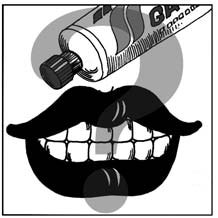Raymond Zhou
The 'rats' just keep nibbling
By Raymond Zhou (China Daily)
Updated: 2007-05-24 06:54
 |
Large Medium Small |
 It may be the most powerfully suggestive detail of a toothpaste commercial: After trumpeting all the benefits of a brand, the advert closes with the stamp of approval from an authoritative organization called Ya Fang Zu, the Chinese acronym for the National Tooth Health Protection Group.
It may be the most powerfully suggestive detail of a toothpaste commercial: After trumpeting all the benefits of a brand, the advert closes with the stamp of approval from an authoritative organization called Ya Fang Zu, the Chinese acronym for the National Tooth Health Protection Group.
Imagine the shock when the Health Ministry dismantled the group, which the Chinese press described as "one table and two people". Actually, it had a staff of six people and has raked in 27 million yuan ($3.37 million) since its inception in 1997.
The surprise is that its certification was not legally binding and the group itself was not even a legal entity. The non-surprise: Much of the money went into staffers' own pockets.
Mind you, this was not the brainchild of some scam artist. It was indeed affiliated with the Health Ministry but not exactly a department of the ministry.
It is reported that P&G donated 10 million yuan ($1.3 million) to the group in 2002. The multinational company later explained that the money was meant for the namesake foundation and had nothing to do with the certification of its toothpaste.
Whatever the truth, the pattern is clear: A government-endorsed agency uses its power - power that is ultimately derived from taxpayers - to enrich itself rather than serve the public.
Suffice it to say, Ya Fang Zu was not the only offender, maybe not the worst either. The incremental cost to the consumer is so negligible that most people would never have given it much thought.
But there are so many agencies like that in China that they constitute a major burden on the economy. Take the real estate sector. Before ground is broken, the builder needs to get approval from dozens of government agencies. The process involves paying the nominal fee and, very often, a much higher charge in the form of a bribe or a coerced donation.
On top of that come the greedy developers, who add their obscenely fat margins. No wonder housing prices are as high as those in countries where per-capita GDP is 100 times higher than China.
A friend who is a college president told me he had to get an approval letter stamped by 100 different agencies before the college could build something on its campus. And a college is not a business, at least not in name.
That is why officials are adamant in opposing any measure that will require real estate developers to disclose their cost structure.
A senior official in the Northeast recently told me that, in an effort to build affordable housing for the poor, he pressured all agencies to waive their fees. Eventually he was able to lower the cost to 600 yuan ($75) per square meter. As a result, even the poorest of the urban poor could afford a decent unit.
Each of these agencies is supposed to provide a service. But shouldn't we ask how many of these services are really necessary and how many have evolved into get-rich-quick schemes that harm the public more than help it?
For example, food inspection is extremely important. Yet it is not uncommon for inspectors to descend on a farmers' market only to collect their fees. Any inspection they conduct is haphazard, driven by so-called campaigns - meaning when their boss is checking on them.
If you compare the cost of a restaurant meal in China with one in a Western country, you will find that miscellaneous fees levied by the government make up a much bigger share here. This may not be alarming when the economy is running full steam ahead, but it will drain our competitiveness. In a classic poem, these fee collectors are called "rats" that eat away the well-being of the people.
E-mail: raymondzhou@chinadaily.com.cn
(China Daily 05/24/2007 page10)
| 分享按钮 |